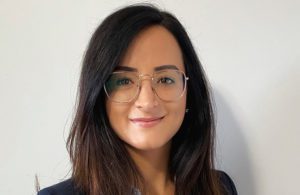
Gabriela Jaquinto, Flexan LLC Senior Quality Engineer [Photo courtesy of Flexan]
“I was born and raised in São Paulo, Brazil, and have always been passionate about traveling and exploring different cultures,” said Gabriela Jaquinto.
“I permanently moved to the U.S. in 2009 where I went on to graduate from the University of Illinois at Chicago with a bachelor’s degree in industrial engineering. My first exposure to the medtech world transpired when I came across the opportunity to work at Flexan a couple years after graduating. From a young age, I was drawn to activities that allowed me to solve problems and make an impact. It was always important to me to work for an organization that matched my energy and was also committed to making an impact. After 4 years with Flexan, I have not been disappointed. It has been such a challenging yet fulfilling journey. I can no longer imagine myself working in any other industry.”
What first drew you to medtech? When did you first know you wanted to be in the industry?
Jaquinto: When I was first introduced to Industrial Engineering, I was captivated by the flexibility associated with the degree. The idea of being exposed to a variety of engineering tools while still being able to forge my own path was very exciting. When I came across the opportunity to work in medtech and play a role in the development of medical components and devices designed to improve and even save people’s lives, I knew I had to pursue it.
What projects, past or present, have made you love what you do?
Jaquinto: I find projects associated with new product implementation to be incredibly exciting. I enjoy developing structured systems for successful and robust implementation of new products into manufacturing, which is something Flexan really focuses on and encourages. Since joining the organization, I have had the privilege of being involved in a wide range of meaningful projects of this type. For instance, I was part of a team involved in the implementation of silicone molded components which are assembled into shunts employed for the management hydrocephalus. Another significant project involved leading the implementation of a nasopharyngeal test swab packaging line suitable for supporting mass Covid-19 testing. And these are just a few examples. These projects are all very dynamic, and each present their own unique challenges which ultimately expands our ability to work as a team and improve our systems.
What projects are you most looking forward to?
Jaquinto: I tend to lean towards challenging, fast-paced projects that promote teamwork. I am very excited about the opportunity to be involved in autonomation projects. Validation of these complex systems in the medtech industry is no easy feat. Every detail associated with these systems must be considered and adequately documented. There is an incredible amount of brainpower necessary to determine the appropriate requirements, not just from a technical perspective but also from a quality and regulatory point of view. With these types of projects, teamwork is also critical to brainstorm and mitigate any potential risks to allow for a smooth implementation.
What are some of the barriers women face in today’s medtech industry, if any?
Jaquinto: The medtech industry has certainly come a long way in terms of promoting diversity in the workplace but the number of women in high-level positions is still very low. Women still face challenges with unconscious biases in the workplace, as well as policies that do not always promote a flexible working culture.
Describe your biggest leadership challenge. How did you conquer it or resolve it, or what was the outcome?
Jaquinto: Understanding that motivation looks different for each person has been a challenge for me. Each person is unique and brings a different set of skills to the table. That is really what makes the world so beautiful, and chaotic at times. I am slowly learning the different ways to communicate and engage individuals to perform at their highest level to achieve common goals.
Talk about your leadership skills. What is the most important lesson you have learned that has guided you in your career?
Jaquinto: In my opinion, the greatest leaders are those who understand that their teams are the key to success and are always seeking out ways to empower others. Great leaders exhibit a positive attitude and have this remarkable ability to show respect and empathy even when making the hard decisions. I believe it is so important to understand and appreciate the work at all levels of the organization, regardless of hierarchies. I strive to be mindful of how my actions and reactions may impact others and roll up my sleeves to help others any chance I get.
In your opinion, what more can be done to promote greater participation of young women in the medtech industry today?
Jaquinto: I believe it is important for companies to encourage an open dialogue and discussion about diversity in the workplace and demonstrate a commitment to giving women an active voice. In my experience, women tend to be more modest when it comes to their own achievements. Companies should acknowledge the skills and expertise that women bring to the workplace, and foster a culture that empowers, not just women, but all employees to be their best versions.
Why is it important for companies to be more inclusive and have more women in charge?
Jaquinto: Women can be powerful, effective leaders capable of promoting innovation, challenging the status quo, and pushing companies to become more adaptable to changes. I am a firm believer that when individuals from different backgrounds work together, unique ideas are exchanged which ultimately leads to more creative ways to solve complicated problems.